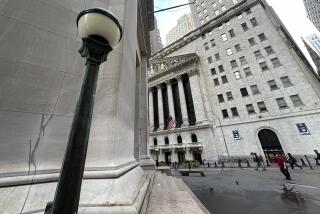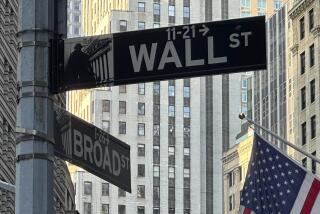Rallying Respond to Global Crisis
- Share via
Latin American stocks skyrocketed Tuesday on optimism that the United States and other Western nations will soon offer a multibillion-dollar aid package to shore up the region’s beleaguered currencies.
Brazilian stocks rose nearly 19% in their biggest single-day rally in three years, and Argentine stocks soared 8.9%, posting their biggest one-day gain since March 1995. Mexico’s benchmark stock index, meanwhile, posted its biggest leap in a decade, gaining 12.9%, as the peso also rose to a seven-day high.
Markets were boosted by the likelihood of a bailout package that, according to Brazilian Finance Minister Pedro Malan, could take the form of a $26-billion line of credit from the International Monetary Fund and Group of 7 industrialized nations. Earlier Tuesday, the World Bank said it would also contribute.
Such a bailout could reverse capital flight and restore confidence in stock markets that have been battered in Brazil and other Latin American countries since Russia’s default and devaluation in August. Brazil, the world’s ninth-largest economy, has spent more than $25 billion to defend its currency since Aug. 1.
Although its stock market has rallied this week, Brazil’s benchmark Bovespa index is still down 36% since Aug. 1. Brazilian 10-year government bonds now carry interest rates of 17.3%, or 12 percentage points higher than interest on comparable U.S. notes. That spread shows the risk that investors see even in Brazil’s sovereign debt.
The steady capital drain and investor flight is increasing the probability that a Brazilian devaluation could occur. Worries over how that could harm neighboring economies and repercussions for the United States have led to an attitude shift within the global financial community to urge intervention. Aid could take the form of a credit line, a lowering of interest rates or both. Tuesday’s market spike reflects the expectation that some act of intervention will be taken soon.
“People are optimistic that somebody might be coming to the rescue,” said Michael Henry, Latin American economist at ING Barings in New York.
*
The optimism may be premature, however. Although the U.S. and other industrialized nations agree that aid is needed to stave off an emerging-market collapse, there is no accord on what shape an aid package may take, Malan’s remarks notwithstanding.
In fact, Brazil’s president denied late Tuesday that the government has requested aid.
Henry said the stock market rally of the last three days will be short-lived unless some package materializes soon.
Meanwhile, capital continued to flow out of Brazil on Tuesday, with $335 million leaving the country, according to preliminary figures.
“What we’re seeing is not some ringing endorsement of Brazilian economic policy. Until we see overall that these things come to fruition, it will be hard to sustain a real rally,” Henry said.
Brazil’s market chaos was the cause for Tuesday’s disappointing privatization of a state-owned power generation utility, Gerasul. The utility sold at the minimum bid of $801 million and only one bidder, Belgium’s Tractebel, made an offer.
At least two U.S. companies, AES Corp. of Arlington, Va., and Southern Co. of Atlanta, backed away after first showing interest.
Brazil had hoped for a premium of as much as 35% over the $801-million minimum, said Santander Investments analyst Alexandre Braghetta in Sao Paulo.
This is the first of as many as 10 power-generation utilities that the government will auction off over the next year or so.
Looking on the bright side, the government was lucky that the auction came off at all, said Sandra Boente, a Latin America utility analyst with Salomon Smith Barney in New York.
“The possibility of a devaluation makes a utility less attractive because it is by nature a business in which there is a time lag between a rise in costs and the ability to collect those costs from ratepayers,” she said, adding that a devaluation would produce inflation and a resulting upward spiral in costs.
In Mexico, as millions of people prepared to celebrate independence day today, analysts welcomed a surge they hope signals a real shift in market sentiment following the international community’s pledges of support.
Analysts said the market was buoyed by a preliminary agreement Monday by Mexico’s main political parties on a process to resolve the nation’s bank rescue program. The parties have been wrangling for months over how to pay for the $55-billion bailout of the banks following Mexico’s own financial crisis in 1995. Now it looks like an accord can be reached within a few weeks.
*
With Mexico’s fundamentals regarded as healthy, the bank bailout dispute is one of the few internal factors affecting investor confidence.
U.S.-traded Mexican stocks recorded huge gains Tuesday as investors piled in. Telmex, the phone monopoly, surged nearly 15% to $42 on the New York Stock Exchange. Grupo Televisa soared 19.2% to $18.63.
The peso, meanwhile, strengthened for a second day, up 1.5% to 10.17 to the dollar from 10.33 on Monday and the record low of 10.60 on Friday, but it is still off more than 25% of its value since the start of the year.
The Mexican stock market remains down 35% this year, after its 52% rise in 1997 made it one of the world’s most attractive emerging markets.
The Mexican central bank has taken a series of tough steps to reduce the nation’s money supply and protect against inflationary pressures caused by a weaker peso.
As a result, interest rates have more than doubled. Rates on 28-day Mexican treasury bills soared by 10 percentage points at Monday’s weekly auction, to 47.68%.
While analysts have applauded the anti-inflation measures, they worry that the high interest rates--if sustained for long--will dampen economic growth and put the already anemic banking sector under further pressure.
(BEGIN TEXT OF INFOBOX / INFOGRAPHIC)
Latin Stock Plays
Huge gains in battered Latin American stock markets on Tuesday were reflected in their U.S.-traded shares. A sampling of Latin American stocks and closed-end mutual funds traded on the New York Stock Exchange:
*--*
Ticker 52-week Tuesday Stock symbol High Low Close Change Pct. chg. Grupo Simec SIM $7.44 $1.63 $2.13 +$0.50 +30.7% Telebras TBR 147.69 49.56 72.13 +13.63 +23.3 Telecom Argen. TEO 38.44 20.00 27.81 +4.81 +20.9 Grupo Televisa TV 43.25 14.88 18.63 +3.00 +19.2 Madeco MAD 24.75 4.00 5.00 +0.75 +17.6 Mexico Fund MXF 23.44 7.56 9.75 +1.31 +15.5 Brazil Fund BZF 30.00 9.31 12.69 +1.69 +15.4 Coca-Cola Femsa KOF 20.94 10.75 13.69 +1.81 +15.1 Telmex TMX 58.44 32.75 42.00 +5.44 +14.9 YPF YPF 38.13 18.69 25.00 +3.00 +13.6 Pepsi Gemex GEM 17.75 7.25 9.38 +0.50 +5.6 Chile Fund CH 25.50 7.13 7.63 +0.13 +1.7
*--*
Source: Reuters
More to Read
Sign up for Essential California
The most important California stories and recommendations in your inbox every morning.
You may occasionally receive promotional content from the Los Angeles Times.













